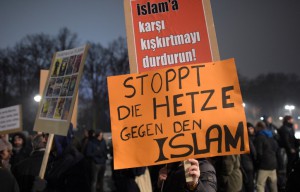A day after terror struck Paris, Europe’s far-right and anti-immigrant parties pressed home the message that has fueled their resurgence: The continent’s rising numbers of Muslims are dangerous.
Populist movements warning of the “Islamization” of Europe have been gaining ground in small countries like Denmark and large ones like Britain, Germany and France. The attack on satirical newspaper Charlie Hebdo could win more supporters to their cause.
Fears of precisely the kind of commando-style attack that struck the newspaper on Wednesday, killing 12 people, have risen sharply in recent months as home-grown fighters return from Syria and Iraq. Such warnings have been aired across the political spectrum, but the anti-immigrant parties have been at the forefront.
Now the surreal scenes of carnage on a quiet Parisian street — with cartoonists as victims — are likely to feed into the arguments of right-wing forces that have been the loudest in declaring Islam to be incompatible with Western values. There are concerns that more mainstream Europeans will be pulled into their orbit, and that mainstream parties will be tempted to parrot the hard-line rhetoric.
Even as Europe’s Islamic community leaders lined up to condemn the terrorism, and a Muslim policeman emerged as a hero in Wednesday’s drama, populist forces lost no opportunity to lash out against Europe’s Muslim population.
In Britain, Nigel Farage, leader of the anti-Europe, anti-immigrant UK Independence Party, said the attacks were the result of “a fifth column” of people living within Western societies “who hate us.”
His language was condemned by other politicians. Deputy Prime Minister Nick Clegg, leader of the Liberal Democrats, accused Farage of implying “that many, many British Muslims who I know feel fervently British but also are very proud of their Muslim faith are somehow part of the problem rather than part of the solution.”
In the nation hit by the terror, Marine LePen, leader of the surging far-right National Front, urged the French to wake up to the threat of Islamic fundamentalism: “The time of denial, hypocrisy is no longer possible.”
Some of the most vocal rightist response to the terror in Paris was in Germany, where the Nazi past has long made xenophobic rhetoric taboo.
A leader of the far-right National Democratic Party, or NPD, said the party would mobilize followers to join anti-Islam street protests in the eastern city of Dresden that have been growing in size over the past three months.
“It happened in Paris but it could have happened in Berlin, too,” said Holger Szymanski, a member of the NPD’s top leadership told The Associated Press.
“We’re calling on our members to take part in all protests taking place against Islamization,” Szymanski said. “Why should we call for calm?”
Alexander Gauland, a senior figure for the nationalist Alternative for Germany party, which received about 10 percent of the vote in two recent regional elections, said the attack discredited his camp’s critics: “All those who have so far ignored or laughed at the concerns many people have about the looming danger of Islamism have been proved wrong by this bloody deed.”
A group calling itself the Patriotic Europeans against the Islamization of Europe, or PEGIDA, condemned the attack in a Facebook post that quickly generated more than 11,000 “likes” and 1,500 comments. The group has been organizing the Dresden marches.
German officials lashed out against the groups, with Justice Minister Heiko Maas saying Thursday that the way PEGIDA, the NPD and others were “trying to exploit this attack for their own purposes is disgusting.”
“We mustn’t allow our society to be divided,” Maas said. “The overwhelming majority of Muslims condemn the attack as a betrayal against their beliefs.”
But organizers of the PEGIDA marches, which last week drew up to 18,000 people in Dresden, said they saw the attack as a vindication of their stance.
“The Islamists that PEGIDA has been warning about for 12 weeks showed today in France that they are not ready for democracy, but see violence and death as a solution,” the group said on its Facebook page Wednesday.
“Our politicians are trying to make us believe the opposite,” it continued. “Does such a tragedy need to happen in Germany?” PEGIDA leaders did not respond to a request for comment from the AP.
While PEGIDA marches outside Dresden have been small, their spread has alarmed politicians in Germany 70 years after the Holocaust. And its influence is spreading beyond Germany’s borders, with supporters in Austria announcing that plans to stage a protest within the month.
In the Netherlands, Geert Wilders, the firebrand leader of the anti-Islam Freedom Party, said there’s no problem letting Europe’s young Muslims fight jihad in Syria.
“People should be allowed to leave,” he said, “but should never be allowed to return.”

